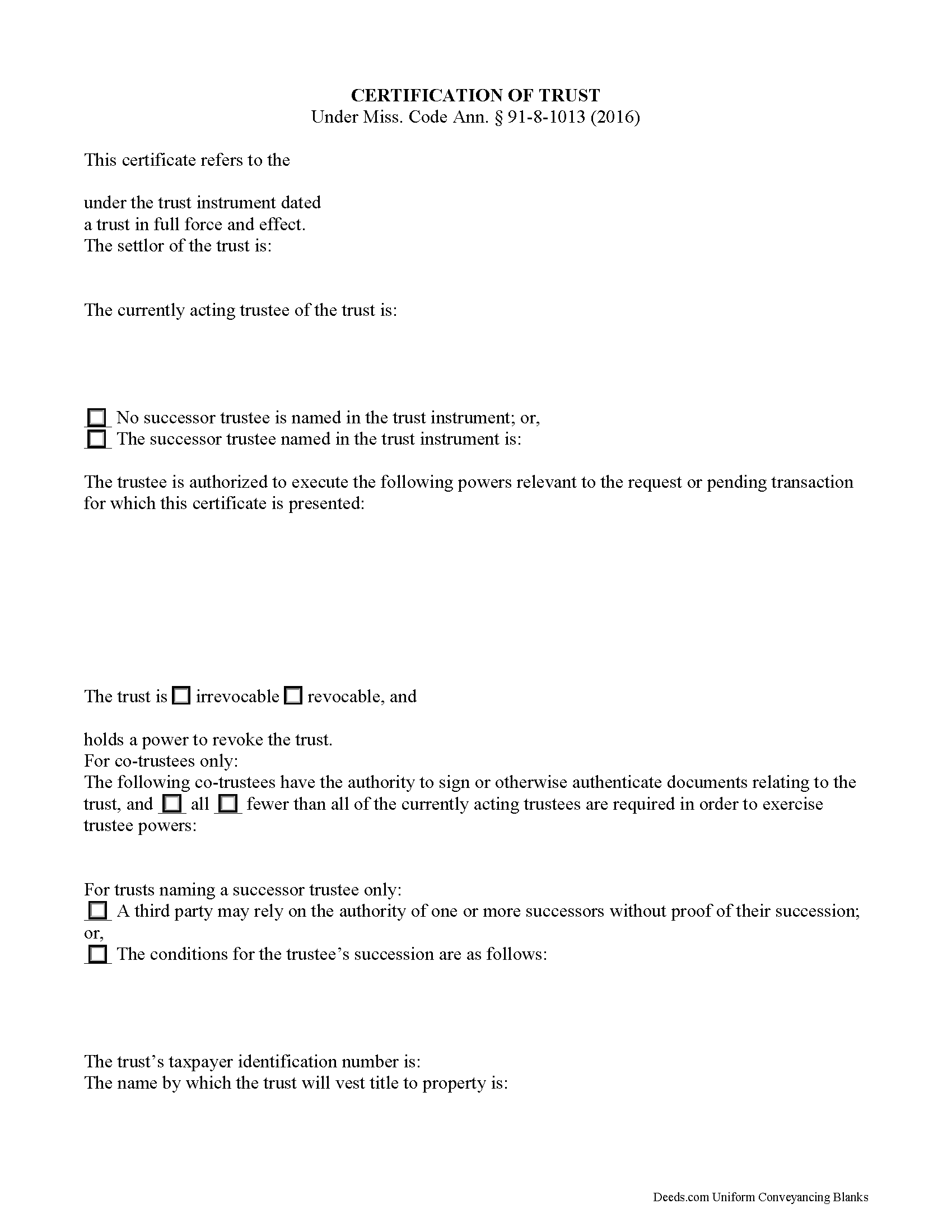Download Mississippi Certificate of Trust Legal Forms

Mississippi Certificate of Trust Overview

Using a Certification of Trust in Mississippi
The certificate of trust is codified under the Mississippi Trust Code at Miss. Code Ann. 91-8-1013. This certified document is an abstract of the trust instrument, a generally unrecorded document executed by a settlor and containing the trust's full provisions.
A trustee presents the certification of trust when entering into transactions with persons other than trust beneficiaries. It offers proof that the trust exists and the trustee has the authority to enter into the transaction on behalf of the trust. The section of the Mississippi Code covering the certification of trust offers protection to parties dealing with trustees, even if they fail to request a trust certificate (Miss. Code Ann. 91-8-1013(e)).
In a trust arrangement, a trustee administers a trust estate transferred to the trust by a settlor, for the benefit of a third person or party, called the beneficiary. When the trustee conducts business with someone outside of the trust relationship, the certification of trust allows the trustee to maintain the trust's privacy; the identity of trust beneficiaries, the disclosure of which is not essential to the transaction, remains undisclosed.
The form requires a statement of affirmation that the trust exists and the date of its formation. The document includes the trust's identification number only "if it is essential to the transaction for which the request for the trust document is made" (Miss. Code Ann. 91-8-1013(a)(8)). It discloses the trust's settlor, acting trustee, and anyone with a power to revoke the trust, if applicable. The document provides the name of any successor trustee with either a description of the conditions for his succession, or a statement that the recipient may rely on the authority of successor trustee without proof of succession.
Certificates for trusts with multiple trustees include a section that names all trustees who have signing power under the trust, and identifies whether or not all of them are needed in order to conduct trustee powers.
Because the certificate is presented pursuant to a specific transaction, the form requires a description of the trustee's managerial powers relevant to the request. When the certificate affects real property, the document provides the legal description of the parcel or parcels subject to the transaction. It also describes the name by which the trust will hold title to (vest) property.
Any acting trustee with signing authority as cited in the body of the instrument can sign the certificate in the presence of a notary public. The trustee certifies "that ... the trust has not been revoked, modified, or amended in any manner that would cause the representations contained in the certification of trust to be incorrect" (Miss. Code Ann. 91-8-1013(a)(10)). All statements in the certification of trust are deemed correct, and a recipient is not liable for acting on the information contained within (Miss. Code Ann. 91-8-1013(d)).
Recipients presented with a certificate may ask the trustee for additional information to clarify any ambiguities in the certificate (Miss. Code Ann. 91-8-1013(f)). Trustees, of their own accord, may provide copies of portions of the trust instrument and/or trust amendments, but are not required to do so (Miss. Code Ann. 91-8-1013(c)).
Trust law can be complicated, so contact an attorney with questions about using a certificate of trust or trusts in Mississippi.
(Mississippi COT Package includes form, guidelines, and completed example)